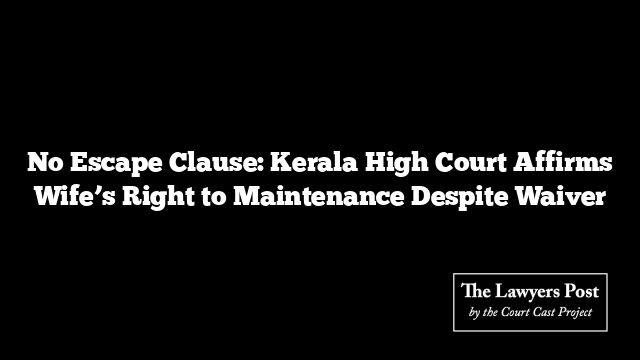In a sharp reminder that legal rights cannot be signed away by private deals, the Kerala High Court ruled that a woman remains entitled to maintenance under the Protection of Women from Domestic Violence Act, 2005 (DV Act) — even if she had earlier agreed to waive it.
Justice A Badharudeen, delivering a decisive verdict, made it clear: any agreement where a wife surrenders her legal claim to maintenance stands against public policy and holds no water in the eyes of the law.
Drawing from the rulings of both the Supreme Court and Kerala High Court, the judge underlined that the duty of a husband to support his wife and children is a statutory obligation — one that cannot be brushed aside by mere paperwork.
“When a wife signs away her future maintenance rights, whether through a court compromise or a private settlement, such a clause is invalid. Her right to claim maintenance — or her children’s — remains intact,” the Court firmly stated.
The case arose after a woman petitioned for interim maintenance under Section 20 of the DV Act. She revealed that her marriage had ended in 2018 following persistent harassment for gold and money, which spiraled into domestic abuse. With no independent income, she sought financial relief, pointing out her former husband’s hefty earnings of over ₹15 lakh a month.
The husband, however, waved a 2017 notarised agreement before the court, insisting that she had renounced all claims for support. He further alleged she was operating a yoga studio, pulling in ₹2 lakh monthly.
Neither the magistrate nor the appellate court bought his story. Awarding her ₹30,000 a month in interim maintenance, both courts dismissed his claims about her income and ruled that the notarised agreement could not strip her of her statutory rights.
Not one to accept defeat lightly, the man escalated the matter to the High Court.
But the High Court, after a close inspection of the facts, found no merit in his arguments. It pointed out that the so-called agreement didn’t even mention any payment in lieu of maintenance — and even if it had, the waiver would still be legally meaningless. Rights granted under the DV Act, including maintenance, persist even after divorce, the Court emphasized.
Finding the interim maintenance fair and just, the High Court refused to interfere with the lower court’s order, effectively sealing the woman’s right to support.





